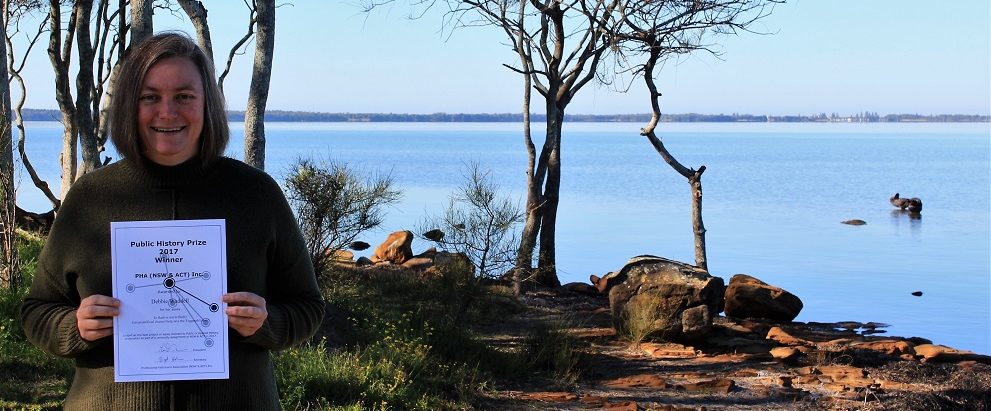… This year’s Public History Prize winner, Debbie Waddell talks about what history means to her.
What are your plans after university? Are you pursuing a career in the history sector?
After completing my BA later this year, I hope to undertake Honours, collaborating with a local environmental volunteer organisation to assist them to produce an oral history that both documents and celebrates their successes. However, beyond that, with all my fingers and toes crossed, I absolutely hope to be pursuing a career in the environmental history sector.
Why did you choose to write about the topic of your prize-winning essay?
In 2017, when many NSW councils merged, the Save Tuggerah Lakes (STL) political party ran for election in the newly formed Central Coast Council. Now, I hate to admit to being one of those voters who shows up on polling day with absolutely no inkling of which party to vote for, but sadly, I usually am. However, when I first saw a campaign banner for the STL in the lead up to this election, my curiosity was immediately piqued. Intrigued, I wondered, were the STL’s policies after my own heart? Were they going to help save the Tuggerah Lakes in the manner I believe they deserve to be saved? That is, for humans and non-humans equally. Thus, armed with this question as motivation for my essay, I set about investigating if a permanent channel at The Entrance (one of the STL’s policies) could actually help save the Tuggerah Lakes.
Why is history important today?
For me, I think we often find ourselves, individually and collectively, somewhere, anywhere at a moment in time, making decisions about our future and mistakenly doing so based on the assumption that what we see before us, is just as it always has been. We often fail to recognise that ourselves, our landscape and our society are all a product of countless years of nature and nurture; that is, they are a product of history. However, if we do acknowledge this and arm ourselves with history, I believe we can definitely make better decisions for our future.
What’s your favourite historical source, book, website or film?
Gosh, narrow it down to one? That seems almost impossible! As someone who tends to focus on local history, I love the book Blue Gum Flat to Budgewoi: the story of Wyong Shire’s wonderful valleys, lakes and beaches.[1] It is my starting point for all things Wyong and surrounds. However, as I’ve gone through university, for absolute convenience, I just can’t imagine what I would have done without the Trove website. From tracking down which library or archive has a particular source I’m after, to spending countless hours (some productive and others…well…sidetracked) trawling through old newspaper articles, Trove definitely takes the cake.
If you had a time machine, where would you go, and why?
In my suburban front yard I have a magnificent gum tree, one that my grown family of four can barely join hands around and which must be hundreds of years old. The history enthusiast in me often ponders what this tree has experienced, what it has witnessed. Whilst the greenie in me wonders how to care for it. Did koalas once munch on its leaves? Or kangaroos graze beneath it? What other native vegetation grew nearby it? Did it provide a source of food, industry and/or entertainment for its traditional Aboriginal custodians? Did colonial settlers shade under its majestic canopy when they first explored the region? What elements has it thrived on? or, perhaps, even in spite of? Thus, as the current custodian of the tree, if I had a time machine, I would go back to when it was a fledgling sapling and whizzing through time, the historian in me would simply soak up its history, so the greenie in me could learn to provide for its future.
[1] Swancott, Charles. Blue Gum Flat To Budgewoi: The story of Wyong Shire’s wonderful valleys, lakes and beaches. Gosford: Berkelouw Bookdealers, 1963.

Congratulations again on your prize, Debbie! I liked your logic and the pragmatic focus of your investigation – the more history we build into policy, the better! Best wishes for honours.
Exactly!